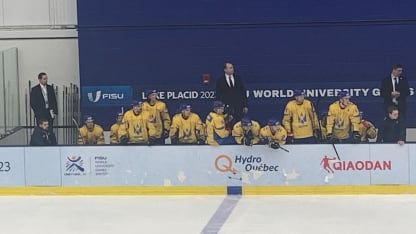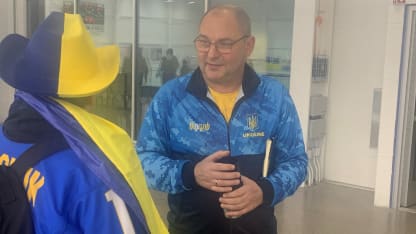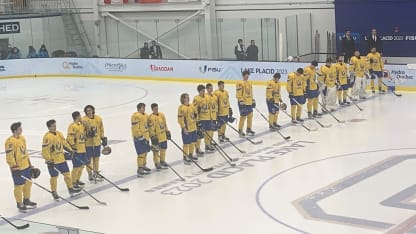Ukrainian hockey team stages own miracle on ice in North America
Inspires during barnstorming tour, World University Games while countrymen battle Russian invasion

The most famous of them all, the "Miracle on Ice," transpired nearby at the 1980 Lake Placid Olympics, when the United States defeated the Soviet Union in a men's hockey game.
It is the most celebrated game in the history of the sport -- if not all sports -- a David vs. Goliath moment that has been celebrated in articles, books and movies.
This week, another miracle occurred here in the heart of the Adirondacks.
A team of Ukrainian hockey players participated in the FISU World University Games while their home country is being invaded by Russia in a battle that started 11 months ago. It is the first time a Ukrainian national men's hockey team has competed in North America.
"It is kind of a miracle we are here," said Dmitri Khristich, the team's video coach and most accomplished of the 12 Ukraine-born players to play in the NHL.
This time, the miracle was not in the results.
Ukraine finished with a 2-3 record, defeating Sweden 12-2 and closing pool play with a 3-1 upset of Czechia, each a notable and prideful accomplishment.
The miracle was in the participation, in these young Ukrainian men showing up with a positive, can-do attitude in the face of unimaginable suffering back home.
"[It's] kind of unthinkable," said Khristich, who had 596 points (259 goals, 337 assists) in 811 NHL regular-season games for the Washington Capitals, Los Angeles Kings, Boston Bruins and Toronto Maple Leafs from 1990-2002, and 40 points (15 goals, 25 assists) in 75 Stanley Cup Playoff games.

The team spent the better part of a month on the road, playing in a four-game barnstorming Hockey Can't Stop! tour of Western Canada to help raise funds for the Ukrainian Ice Hockey Federation and its efforts to keep the game alive in their country before reporting to the World University Games.
They were helped along the way by NHL teams. The Calgary Flames and Edmonton Oilers helped out around games against the Calgary Dinos and Edmonton Golden Bears. The Winnipeg Jets donated use of their arena, Canada Life Centre, for their game against the Manitoba Bisons
The tour, and the appearance here, were important because hockey is on life support in Ukraine, says Aleksandra Slatvytska, the executive director of the Ukrainian Hockey Federation and one of the masterminds behind the Hockey Can't Stop! tour.
Proceeds from ticket sales on the barnstorming tour and from event fundraising activities were donated to the Ukrainian Hockey Dream foundation and to provide humanitarian aid for the children of Ukraine.
Because, at home, all resources are going toward fighting the invasion -- money, raw materials, personnel -- and the survival and liberation of the country is paramount.
There is no government money for the Ukrainian hockey federation to keep the game alive, never mind vibrant. Some arenas have been requisitioned into the war effort; others have been damaged by the invasion.
The professional league has been whittled to six teams playing in the only three rinks in the country with bomb shelters big enough to house the players. According to Ukrainian officials and players here, stoppages have occurred mid-game with the players tromping off to the bomb shelters to wait for the threat to pass and the all-clear to be sounded before a resumption of play.
So, the tour preceding the stop at the World University Games was as audacious as it was necessary.
"An insane idea from the beginning," Slatvytska said, adding that the monetary impact of the tour won't be known for a while yet. "When I went home [during the summer], everyone told me this trip -- the tour and the Games -- was impossible, that it couldn't happen. Even in November, I wasn't sure it was all going to happen."
But the Ukrainians made it, playing exhibition games against Canadian colleges before holding their own in their first World University Games appearance.
"A miracle," she said, smiling. "It is kind of a miracle; I am going to say it."

But the fact the Ukrainians competed in the World University Games, an Olympics-style event contested by athletes under 25 years old every two years, is somewhat shortchanged by the miracle moniker.
It is a story of passion and perseverance, one that has created intense emotions for those involved, engendering feelings of pride and accomplishment in the face of what has been an unimaginably trying year for each of them and their loved ones, who have spent day after day worrying about what the future holds and who will make it there.
For these players, that all-encompassing angst has been alleviated by once again playing the game they love and representing the country that is their identity.
Gleb Krivoshapkin says this opportunity meant the world to him. The 22-year-old forward plays in the Ukrainian pro league for HK Kremenchuk, but he knows his appearance here meant more for the sport and his country.
He says his family and friends followed the exploits of him and his teammates as closely as the conditions in the Ukraine allowed.
"It's good for them for us to be here," said Krivoshapkin, who led the team with eight points in five games. "It helps them mentally. It helps them to stay alive."
Instead of collapsing under the yoke of such responsibility, the players embraced it as their mission statement, the contribution they can make to the ongoing effort back home.
"It's motivation, not pressure," said forward Artem Mateichenko, who had seven points in five games. "This is the thing we do the best, and we are trying to show the world we can be good at something."
The 22-year-old left Ukraine before the invasion, moving with his family to the United States. He plays hockey at Manhattanville College, a Division III school in Harrison, New York. But his grandparents remain back home, as do other relatives.
He says his family in Ukraine watched the games, even while under attack. They told him it brought them solace and happiness.
"I hope we can help in this way the people of Ukraine," Mateichenko said. "Maybe they watch and have some fun. This is our dream and our goal."
Those players who return to Ukraine plan to do so with not only unforgettable memories of brotherhood and of the warm receptions they received throughout their tour of Canada, as well as at the World University Games.
They plan to bring back hope in the form of raised funds, as well as practical knowledge gleaned while spending more than three weeks immersed in the more advanced North American hockey culture.
"This experience will not only help us to grow, and it has, but we will bring back the lessons we have learned about hockey to Ukraine and show the young kids and help them grow as well," defenseman Andriy Grygoriev said.
Krivoshapkin said, "We have shown that nothing is impossible. Maybe this inspires one of those kids to do something great at some point. That's a really nice feeling to have."
Though the World University Games experience was enriching and unforgettable, it is only the beginning for Ukrainian hockey. The struggles to stay relevant in the face of war and economic upheaval remain.
But Khristich says his faith in the sport and his people is stronger than ever.
"We feel hopeful," he said. "In the future, the war is going to be over, they are going to rebuild those arenas in the Ukraine, they are going to rebuild the infrastructure and do a lot of the stuff that needs to be done.
"Hockey will exist no matter what the politics are. We cannot wait on the government because the government is focused on the war. We can't rely on them.
"We have to do our own job to be prepared to continue hockey in the Ukraine, because hockey is a great sport and hockey is life for so many people. It's all up to us."

















